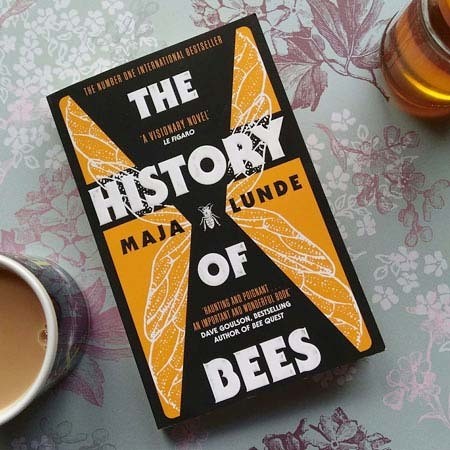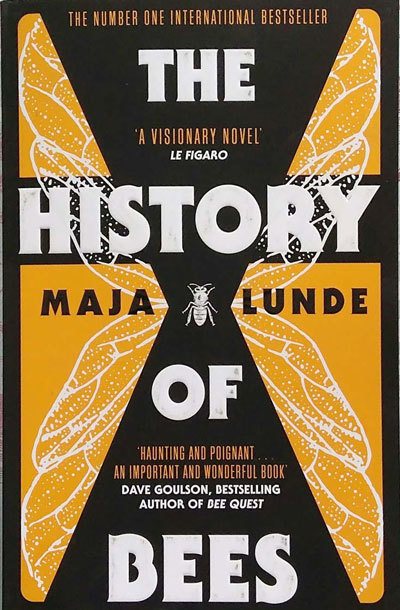Loss and hope collide across time in The History of Bees
This post may contain compensated links. Read my disclaimer hereThe History of Bees by Maja Lunde
Scribner, 2017. 352 pages.
Genres: Literary Fiction / Historical Fiction / Dystopian Fiction
We rate it: 5/5
Buy now from:
Waterstones Amazon.co.uk Amazon.com
“England, 1851. William is a biologist and seed merchant, who sets out to build a new type of beehive – one that will give both him and his children honour and fame.
United States, 2007. George is a beekeeper and fights an uphill battle against modern farming, but hopes that his son can be their salvation.
China, 2098. Tao hand paints pollen onto the fruit trees now that the bees have long since disappeared.”
Book review: The History of Bees by Maja Lunde is a compelling read
Reading The History of Bees provoked mixed and uneasy feelings. The three main characters – William, George and Tao – were not always endearing or even likeable. In fact a lot of the time I really felt quite annoyed with them, particularly William and George.
However, despite their stubbornness or perhaps due to it, I found myself rooting for each of them to succeed. And despite the future without bees revealed in Tao’s story, I felt hopeful for them all.
Lunde is successful in taking the reader along the journey with the protagonists. As readers, we hang on to the fate of Tao, George, William and their respective families. Despite the prospect of a dystopian conclusion, the narrative holds the reader on in hope and does not disappoint.
There is much at work in the novel. Of course, it is about bees. And it is about the very real and frightening consequences of Colony Collapse Disorder. This disturbing age-old phenomenon has risen steeply in recent years. The prospect of losing the bees entirely looms heavily over the narrative.
But the novel is not just about bees. It also deals with themes of parenthood, loss and the gaps of understanding between generations and peers. Each of the three protagonists deals with issues of separation from their children – either physically, intellectually or emotionally. The difference between parental expectations and what their children actually want and need is stark.
The gap between the characters’ and their spouses’ expectations are also explored. And across the gaps of time and geography Tao, George, and William have a lot in common in this area. Their relationships are all threatened in different ways by their persistence in following their chosen paths. They refuse to let go of the passions which lead and direct them.
A compelling story of harsh work and family legacies
However, each character has different values and expectations, especially when it comes to their children. George wants his son Tom to be enthused by his bee farm – a family legacy. He wants Tom to learn from the practical experience of working with the bees. However, Tom is happier at college absorbing himself in books, learning and writing.
Intellectual Tao wants her child, Wei-Wen, to be academically successful from a young age. Her intelligence has not spared her from a life of harsh manual work. But she hopes Wei-Wen can stand out and this will keep him from the gruelling work. She uses the one hour a day between work and brief sleep to boost his learning.
Wei-Wen could be working in the fields by the age of eight. A world where bees no longer do the work of pollinating crops means there is widespread child labour. Everyone must play a role in supporting the heavily controlled state’s precarious food production.
A struggle for balance and hope
William represents some balance between intellect and practicality. He wants his son Edmund to learn from books. He also wants Edmund to experience the practical results of intellectual efforts. William focusses all his attention on Edmund. In doing so he fails to notice that another of his children is both intellectual and practical.
Having fixed expectations of what works best is a flaw of the three main characters. In different ways, their concerns centre on establishing the superiority of one way over another.
Lunde’s carefully constructed narrative eventually reveals a bigger picture. There is the potential to achieve a balance between both pragmatism and intellect. The efforts of the children provide hope and connection between the three parallel narratives.
What I loved about this book
I loved the way the narratives connect across very different locations and time periods. I also loved the way food, hunger and appetite are explored in contrasting ways across the storylines. And I loved to feel annoyed by the characters while rooting for their efforts to be fruitful!
Who will enjoy The History of Bees?
If you like literary fiction that deals with challenging relationships and self-discovery you will enjoy The History of Bees. The History of Bees asks disturbing questions about humanity and natures near future. So if you like layered stories including historical, dystopian or speculative fiction you will love it too.
You may find inspiration from this book to protect bees in the here and now. The author has provided more information in a Q&A section at the end of the book.
If you liked this…
If you enjoy speculative fiction check out our book guide for fans of The Handmaid’s Tale. Or if you are looking for other books for grown-ups find more ideas here. Plus we’ve got a selection of books for all in our summer reads guide here.
Have you read The History of Bees? What did you think? Let us know in the comments below.
– Find lots more great books for the grown-ups here at readinginspiration.com –
If you comment on this website your email address will not be published. We never use your comment data for marketing purposes. Required fields are marked *
Your privacy is important to us: check out our Privacy Policy here to find out about how data protection is undertaken on this website.
Disclaimer: As an Amazon Associate I earn from qualifying purchases.



